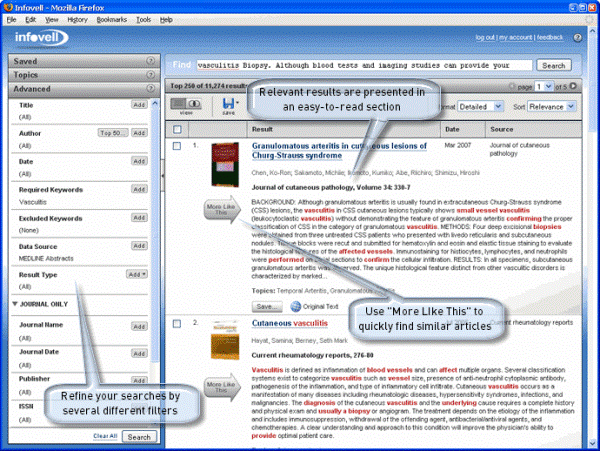What do you do when you need to research something on the web? You just google it, right? Using a web search engine like Google is usually fine for casual searches, but when you need to delve deep into a subject, it just won’t do. What you really need is a research engine that explores the unindexed reaches of the Deep Web. For that, there’s now Infovell, “the world’s research engine.”

Less than 0.2% of the web is indexed and some of the most valuable information lies beyond the search results returned from traditional engines. That’s where a service like Infovell can help. This new subscription-based software-as-a-service (SaaS) engine lets you explore content found on the Deep Web.
What Does Infovell Do?
The engine scours through open-access repositories of information like PubMed Central and the U.S. Patent and Trademark Office Claims, but it also allows access to scholarly journals such as those from Oxford University Press, SAGE, Taylor & Francis, Annual Reviews, Mary Ann Liebert Publications, and more. The culmination of these billions of pages currently unindexed by other engines, gives you access to content in the areas of Life Sciences, Medicines, Patents, Industry News, and other reference content from expert sources. In addition to just functioning as a search engine, Infovell can also deliver breaking news alerts which are automatically sent to your email, PDA, or any other device you choose.

It May Look Boring, But It’s Not
In the demo (see video below), the team from Infovell showed how their engine could be used for researching a medical condition – something that many people try to do today using Google, but with little success. Generally, web searches only return results to sources of general information like the Mayo Clinic results, WebMD, or online support groups. To be able to research something by reading through the actual journal articles that the doctors have access to would be a huge step towards democratizing the world’s knowledge.
Why Can’t Information Be Free?
Unfortunately, that knowledge is not being set free with Infovell. Instead, the service will exist behind a pay wall, which once again puts the power of information into the hands of those that can afford its access. Although expected, it’s disappointing to see that this service will be yet another source of critical information which most people won’t have the time or financial resources to use it. Case in point, if someone needs to research a medicinal condition in that much detail, it’s a sure bet that they have doctors’ bills that are a bigger priority than a subscription fee to a search engine.
Why isn’t anyone building a Google for the Deep Web? If Infovell is offering a collection of scholarly information and putting a price tag on its access, why can’t someone else build a similar collection and wrap ads around the service to monetize it? We love the idea of this type of service, but would would rather see a bigger effort to open up the unindexed web and deliver it to the public for free.
Infovell will be available for a 30-day free trial, starting September 22nd.

















